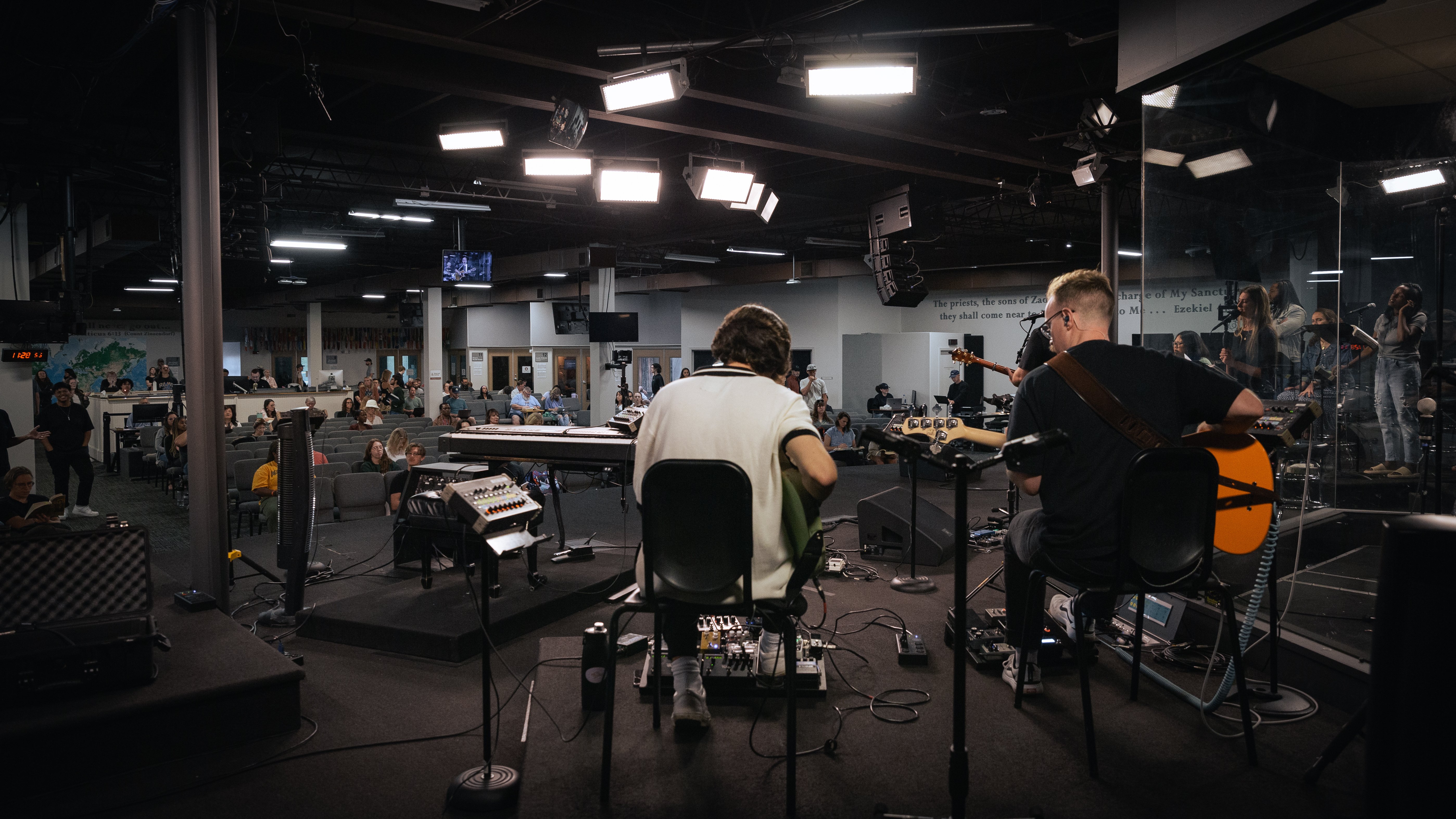IHOPKC's Expression of the Harp and Bowl Model
IHOPKC’s Expression of the Harp and Bowl Model by IHOPKC 6/18/19 20th Anniversary

Time is a thing often taken for granted. We feel the vast mystery of it, whether by the ache of memory or our fascination with the future, yet we rarely ponder the purpose of time as the canvas of discipleship. Time is the caliper by which we measure answers to prayer. As the modern, global prayer movement continues to grow, we must ponder: What time is it?
Let’s first consider the relationship between linear time (generally applied); the notion of “times and seasons” (natural cycles with symbolic potential); and finally, the “fullness of time” (various points in which the first two uniquely culminate in the express will of God). Three passages will be helpful.
Passage 1
Then God said, “Let lights appear in the sky to separate the day from the night. Let them be signs to mark the seasons, days, and years.” (Genesis 1:14 NLT)
From the very beginning, we see that creation was ordained with a rotating pattern of light and darkness, sun, moon, and stars, producing seasons, weather patterns, and sky patterns, the sum of which helps us understand the flow of time in both routine and cosmic increments. This chronological scaffolding supplies humanity with a rare gift: predictability. Predictability has many layers of usefulness. Because God knew humanity would construct their lives around rhythms—morning and evening; winter, spring, summer, and fall; decades, centuries, and millennia—the framework of time was always intended to be prophetically malleable in His hands, forming a fixed substrate upon which future oracles could introduce richly crafted symbolic events: Sabbath, Passover, the Day of Atonement, etc. Thanks to the rigid schedule of lunar and solar cycles, time endowed humanity with a metaphysical constant so that we could better comprehend mysteries such as our loss of immortality compared to the eternality of God. Seasons, their colors and cycles, provide a lexicon to imbue feasts and holy days (holidays) with meaning. By extension, holy days help us understand the sacred versus the profane in that certain times and places can be set aside, marked out, delineated special, no longer common but transcendent. Without time, how would we know? Which leads us to roughly AD 30 when . . .
Passage 2
Jesus came to Galilee, preaching the gospel of the kingdom of God, and saying, “The time is fulfilled, and the kingdom of God is at hand. Repent, and believe in the gospel.” (Mark 1:14–15)
Now we must speak of two kinds of time. Here Mark says, “the [kairos] is fulfilled.” There are two Greek words commonly translated into English as “time,” but they are quite distinct. Chronos refers to chronological time: the minutes, hours, days, and weeks by which we comprehend earthly existence. You measure age with chronos, not kairos. While chronos is kinetic in direction, it is rather static in meaning; necessarily empty, making it perfect to hang things on. Think of a big coat rack thousands of years long, and every second is a hook. You can hang a lot of history on those hooks, because chronos is strong and stable enough to bear the load. Viewed this way, chronos is merely a system for history to happen.
Kairos, by contrast, is almost the opposite. Kairos may be considered static in direction but kinetic in meaning. It is normal time infused with the notion of timing, meaning a right or opportune moment, “a significant time for an action or a decision”—which means it is really not normal at all. Some Bible translations use additional words to convey the idea of “an appointed time in the will of God.” For example, if I say, “The time (chronos) of promise is upon us, it’s time (kairos) to get ready,” I don’t mean, “It’s 8am, we’d better start” but rather, “The unstoppable progression of regular time has reached a point of ripeness that begs our awareness and action.”
This is critical because the passage of time is never a waste. However mundane normal time may seem, it is always a gift. Without chronos, we could not recognize the special times when God breaks in. Mark helps us see this principle. Chronos may roll along, the same as every other day, waiting for a day of fulfillment, but kairos is that day or month or year. Revival, awakening, and reformation are kairos incursions into history. We know them precisely because they are not normal chronos, but you wouldn’t recognize them at all without normal chronos. But then Paul adds a wrinkle . . .
Passage 3
When the fullness of the time had come, God sent forth His Son, born of a woman, born under the law, to redeem those who were under the law. (Galatians 4:4–5)
Interesting! Paul speaks about a “fullness of the time” or the “[pleroma] of the [chronos].” If you’ve been tracking so far, a thought probably comes to mind: Is there a difference between the fullness of chronos and kairos fulfilled? First, understand that pleroma is a rather choice word for Paul, used strategically about a dozen times in relation to things, people, or time. As it relates to time, pleroma doesn’t really measure quantity (i.e., enough time) but quality (the completeness or perfect use of time). Applied in a general way, the translation is not “Let’s finish up,” but “Let’s use completely the time we have until the vessel of time is full.”
If time is a container, not just hash marks on a timeline, then Paul’s language suggests that fullness moments are only possible when time is used, or spent, a certain way. What do we fill it with? The will of God. Whereas kairos implies the need for human awareness and action, the pleroma of chronos suggests preparations must be made so that kairos moments can occur. There is a distinctly human element in both, but we tend to think we are waiting for kairos moments rather than creating them.
The astute may argue that the context of Galatians 4:4–5 could be construed as making the opposite point. After all, the incarnation of the Son of God hardly seems like it would be some arbitrary, random event, much less created or aided by us in any way. Yet the fact remains that countless human dynamics had been building for centuries and millennia to prepare the way. To think that human agency can contribute to time’s timing—to a fullness of purpose for the release of God’s will—is to submit ourselves to the possibility that we could be agents of the will of God on a personal level. In such a scenario, time itself might be discipled by our obedience.
In this final analysis, the onus is on us not just to recognize a kairos moment when it eventually happens but perhaps even to partner with heaven to help create it, to fill chronos until the boundaries and rigidity of chronos can no longer contain the thing that has been stored up inside it. What happens next the world calls outpouring—chronos becomes kairos. Why else would Daniel give himself to fasting in Daniel 9:2–3, all for the sake of an oracle spoken by a prophet that had already declared the “fulfillment” time? Why would Peter urge us to act in such a way that we could both perceive and “hasten” the coming of the day of God (2 Peter 3:11–12)? Why Ezekiel 22:30 or Isaiah 59:16? Why Matthew 6:10? All of these well-known passages reveal different aspects of God’s desire for humans to partner with Him and His dismay when they don’t.
In conclusion, as we look at the most massive, coordinated, strategic prayer movement happening across the earth, we must ponder: What is coming? How close are we to a fullness moment? We have more than enough history to recognize that kairos happens in cycles of prayer. It is time to gird ourselves like never before and keep praying.

IHOPKC’s Expression of the Harp and Bowl Model by IHOPKC 6/18/19 20th Anniversary

The Bride Has Made Herself Ready by IHOPKC 3/30/21 Artists and Authors

Anticipating Revival by IHOPKC 11/19/19 20th Anniversary